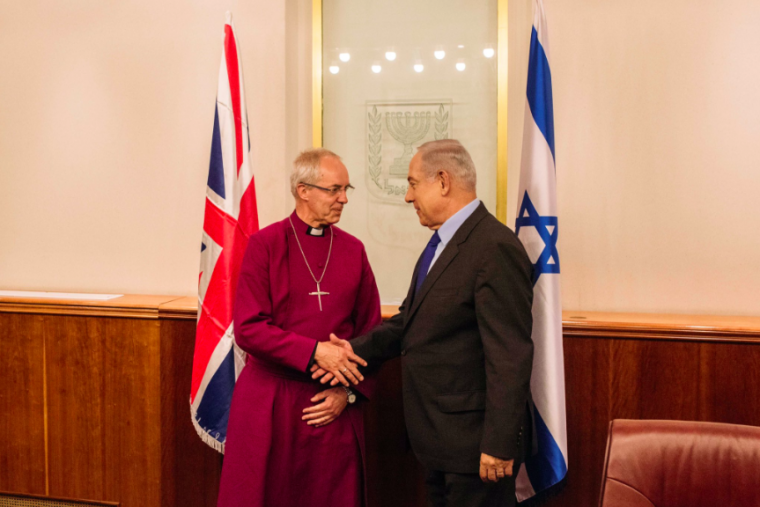Archbishop of Canterbury sees rare 'moment of opportunity' for Middle East peace amid meetings with leaders

The Archbishop of Canterbury has told both the Israeli and Palestinian leaders that he sees a rare 'moment of opportunity' in the dormant Middle East peace process.
Justin Welby held separate, hour long meetings with the Israeli Prime Minister Benjamin Netanyahu and the Palestinian president Mahmoud Abbas amid his 12-day tour of the region. Both encounters were warm, cordial and positive.
Later, during a lively meeting with the Israeli president Reuven Rivlin, Welby said: 'It does seem, listening to many, that internationally perhaps the planets are aligning. Perhaps a moment of opportunity is coming that may not repeat itself for a while. As a Christian, as a religious leader, my hope and prayer is that we can find a way within the region of confidence being rebuilt.'
Rivlin told Welby that the problem was one of 'trust'. He said: 'We are also committed to finding an end to the conflict, to the tragedy, between Israel and our neighbors the Palestinians. But sadly, there is no trust between us. Any solution, any agreement will only be possible if the two sides will have confidence. I believe, we must work to build trust between the Jews and Arabs of the Holy Land.'
However, in unscripted comments, Welby replied by saying that 'there are many surprises in the world at the moment'. Referring to President Trump's forthcoming visit to the region later this month, the Archbishop said: 'Perhaps there might be a surprise that would be of unqualified joy to the whole world that would unravel so many issues, if there could be progress in dealing with the tragedy that has been here for so long.'
The Archbishop spoke to Netanyahu at his Jerusalem office, and with Abbas at the Muqata, the presidential compound in Ramallah.
Welby raised the plight of Christians locally with both Israeli leaders, a day after meeting Christian families in Bethlehem and Beit Jala whose lives have been affected by the separation barrier built by Israel, much of which cuts through the West Bank.
Welby and Netanyahu also spoke about antisemitism, after recalling that they last met at the funeral of Margaret Thatcher in 2013.
With Abbas, the Archbishop raised the difficulties faced by Palestinian Christians, who now make up less than two per cent of the population, and the dangers of extremism.
Welby told Rivlin: 'As a weak minority, a minority that goes back right to the time of Christ himself, [Christians] are caught between greater forces.' The urgent need for peace was illustrated not only by 'those who are expelled from their land by force, by armed military battles surrounding them, but also [by] those who see no hope, no future where they live... and therefore they slip quietly away often unnoticed - and that is a tragedy that is leading in the end in places like Beit Jala to the decline of a Christian community [which goes back to] the very beginning of the history of our faith.'
Welby also referred to 'an element of unfinished business' in the Balfour Declaration, signed a hundred years ago and cited by many Palestinians as the root cause of some of their complaints.
In the declaration, the British government committed itself to supporting the establishment of a 'national home' for the Jewish people in Palestine, adding 'it being clearly understood that nothing shall be done which may prejudice the civil and religious rights of existing non-Jewish communities in Palestine, or the rights and political status enjoyed by Jews in any other country'.
For his part, Rivlin reiterated his invitation to the Queen to visit Israel to mark the centenary. Although a royal visit to Israel has been mooted, it has not been confirmed.











